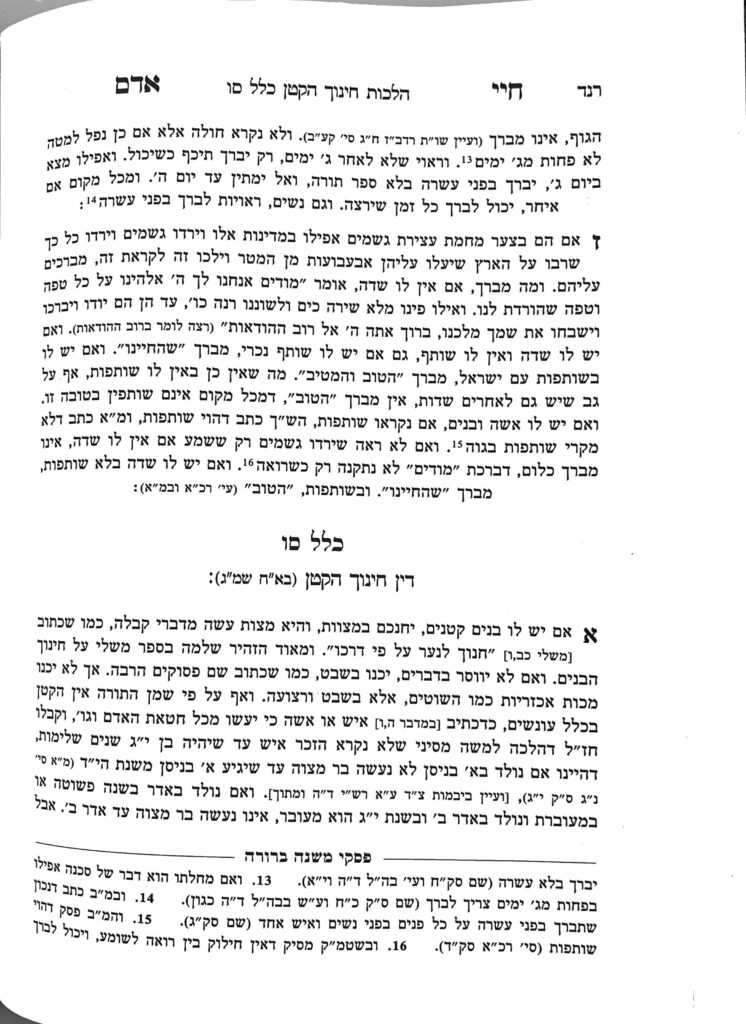We have finished siman 6, regarding birchas hagomeil, and have a few more points to clarify.
The Mishnah Berurah discusses a person traveling down a river. On the one hand, they are not exactly in the situation as described by the pasuk in Tehillim 107 (“yordei hayam ba’oniyos”, those who travel into the sea), but on the other hand, there is an element of danger. The Mishnah Berurah writes that it will depend on the machlokes of the chachmei Tzarfas and chachmei Sefard whether any road is considered to have an element of sakanah (chachmei Sefard; adopted by the Shulchan Aruch), or whether it depends on the level of danger on the road (chachmei Tzarfas; adopted by the Rema) (see more in shiur 1257). The Mishnah Berurah concludes that one does not recite hagomeil in such a situation, in accordance with the minhag Ashkenazim. (Obviously, if a dangerous event occurred during the trip, one would recite hagomeil due to the danger.)
Similarly, if one travels into the water slightly, they would not recite hagomeil, especially if they are able to see the shore. Applying this point to airplanes, if one does not travel over water, they do not recite hagomeil. Even if the plane travels slightly over the water, as long as the shore was still visible, one would not recite hagomeil. Thus, for example, if one travels from Washington, DC to La Guardia airport, even though the standard flight path flies slightly over the Atlantic, one would not recite hagomeil, because the flight does not veer significantly away from shore.
Regarding prison, if one is awaiting trial, they are generally kept in a safe area, such as a holding cell, so they would not recite hagomeil. Even if one were sentenced to jail for a period of time, if the jail is safe, they would not recite hagomeil afterwards. However, many jails in America, and certainly jails in third world countries, are known to be unsafe places, both due to other prisoners and occasionally even from the prison guards themselves. If one ended up in such a jail, they would certainly recite hagomeil afterwards.
If a person chose jail time over paying a fine, the argument can be made that they are no different than one who chose to travel, even though it placed them in danger, so they recite hagomeil. On the other hand, it can be argued that this person chose to do something which is not the derech haolam, normal behavior, and therefore they would not recite hagomeil. A similar argument can be made regarding willingly or negligently contracting various illnesses. The poskim, including the Minchas Yitzchak and Rav Shlomo Zalman Auerbach ztl, conclude that one does not recite hagomeil in such a situation.
If one chooses to be an organ donor, seemingly the same arguments apply. However, the poskim write that in such a case, the donor would recite the bracha, because they are involved in a mitzvah. (The recipient would certainly recite hagomeil due to the danger of requiring a transplant.)
Summary
- If a person travels down a river, or travels a short distance away from shore, they do not recite hagomeil. Similarly, regarding airplanes, if the plane does not travel over water, or veer too far away from shore, they would not recite hagomeil.
- If one is imprisoned in a safe jail, such as in a holding cell, they do not recite hagomeil. Even if they served a sentence, if the jail was safe, they would not recite hagomeil.
- If one chooses to put themselves in a dangerous situation, such as choosing jail time over a fine, or willingly or negligently contracting an illness, they do not recite hagomeil.
- However, an organ donor would recite hagomeil, as they are performing a mitzvah.



